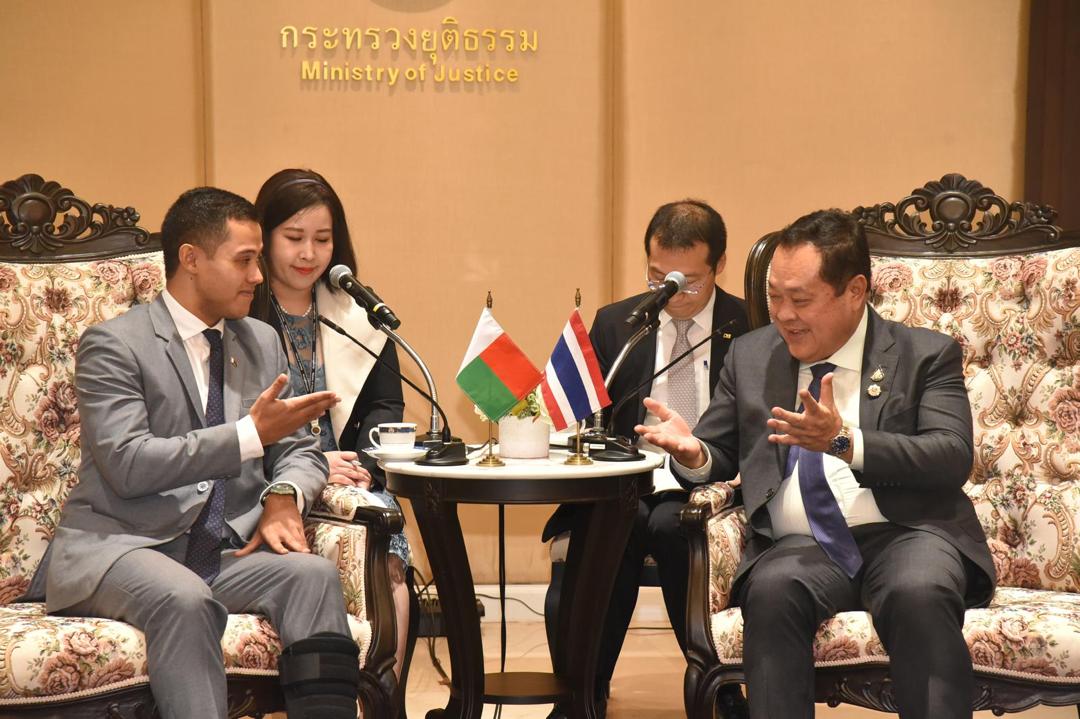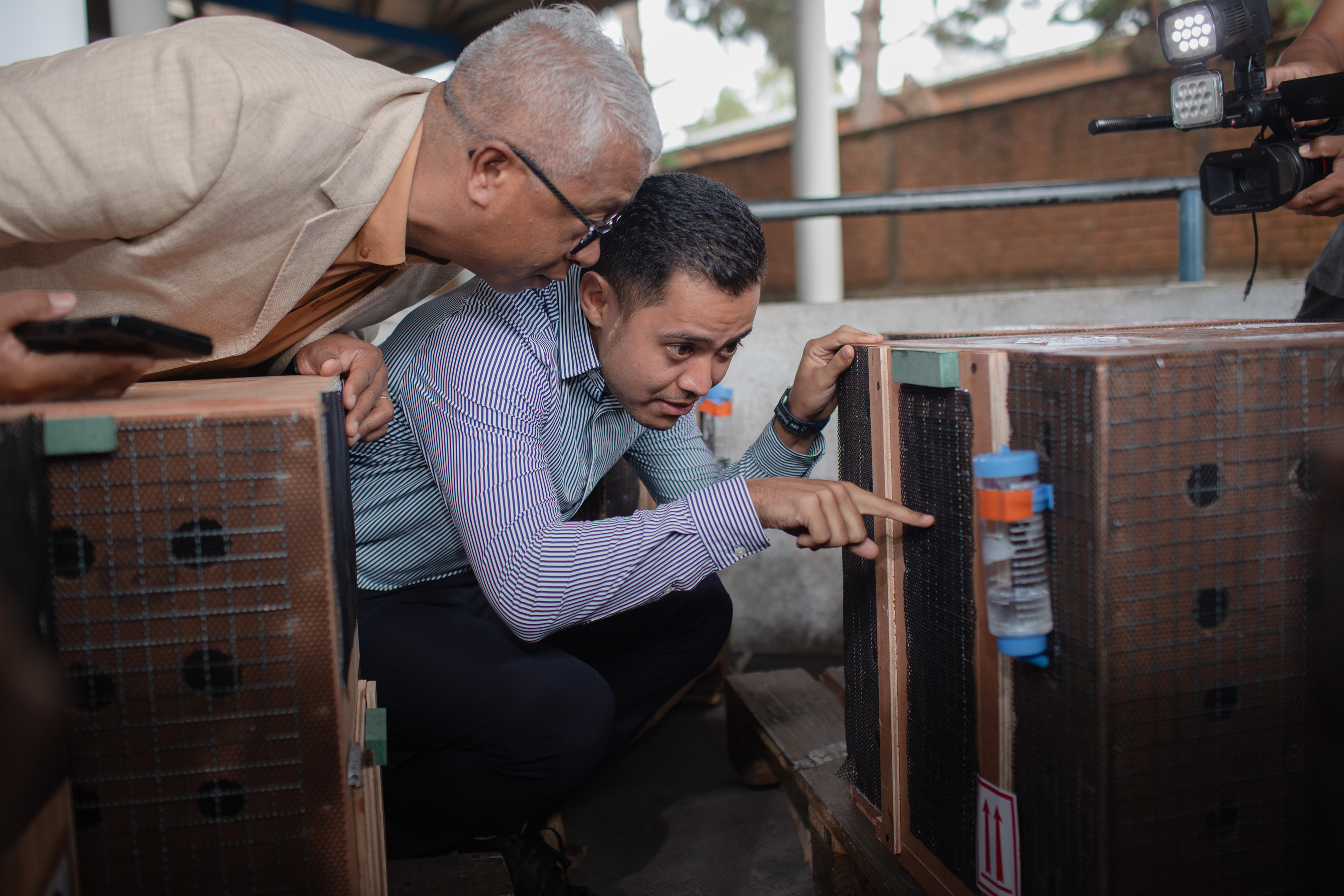UNODC Eastern Africa News and Stories
You are here: Home / News
Madagascar successfully brings back endangered wildlife in cooperation with UNODC and partners
©UNODC. Ring-tailed lemur at arrival at Ivato International Airport in Antananarivo
Antananarivo, 13 December 2024: A victory in the fight against wildlife trafficking unfolded this December as 16 ring-tailed lemurs, 31 brown lemurs, 155 radiated tortoises and 758 spider tortoises – all endangered or vulnerable species – were returned to their native Madagascar.
The wildlife had all been illegally trafficked from Madagascar and transported across multiple countries. After being shipped to Indonesia, the animals were moved across the Malacca Strait by speed boat and driven to Thailand by car. Thai border officials then intercepted the smuggled shipment, paving the way for the species’ eventual repatriation.
A collective effort
In the aftermath of the confiscation in Thailand, the UNODC Regional Office for Eastern Africa, through the Global Programme on Crimes that Affect the Environment, supported a Malagasy delegation headed by Mr. Max Andonirina Fontaine, Minister of Environment and Sustainable Development, to reach Thailand and meet with senior officials to discuss matters related to investigations, mutual legal assistance, health of the confiscated animals and possible repatriation.

Thailand Madagascar Minister of Environment and Sustainable Development, Max Andonirina Fontaine (left) and Thailand Minister of Justice Pol. Col. Tawee Sodsong (right) discussing cooperation in the aftermath of the seizure
Once the repatriation of all animals was agreed by senior officials in Thailand and Madagascar, UNODC reached out to the United for Wildlife programme under the Royal Foundation of the Prince and Princess of Wales, to explore the possibility of free transport. As a result, Qatar Airways offered to fly the animals free of charge from Bangkok to Johannesburg, South Africa, while Airlink provided complimentary transportation from Johannesburg to Antananarivo, Madagascar.

©UNODC Airlink flight disembarking the crates with lemurs and tortoises at Ivato International Airport in Antananarivo, Madagascar
UNODC provided a platform of coordination between the national authorities and the airlines ensuring that logistics, IATA requirements and all required documentation would be in place to allow for a safe and successful operation. Discussions were held to ensure the well-being and health of the animals during their long travel back home. UNODC further supported the presence of Minister Fontaine on the same flights from Bangkok (Thailand) that carried the first shipment. The animals were repatriated in three different shipments during the month of December and landed in good condition at the Antananarivo International Airport.

©UNODC Group photo of Malagasy senior officials and partners from UNODC and INTERPOL at the welcome ceremony at Ivato International Airport for the arrival of the first shipment of repatriated wildlife.
Minister Fontaine commanded the coordination work of each partner that led to the successful repatriation. “This marks a significant step forward as we establish history; this is the first time such a repatriation of animals has taken place, especially for lemurs. While there has been previous repatriation of tortoises, no lemur repatriation had occurred until now. The efforts continue; the fight for the protection of our natural resources is ongoing, and believe us when we say we will not stop until those wicked networks are completely dismantled”.

©UNODC Madagascar Minister of Public Security Herilala Rakotoarimanana (left) and Minister of Environment and Sustainable Development Max Fontaine (right) at the welcome ceremony at Ivato International Airport for the arrival of the first shipment of repatriated wildlife
Upon arrival to Madagascar,veterinarians performed health check-ups to ensure the well-being of the animals after the flight. The animals have been being transferred to different rehabilitation facilities inside of natural reserves in the country, where they will undergo quarantine before starting a rehabilitation process to prepare them for an eventual release into their natural habitats.
"This operation is a powerful example of what can be achieved through dedicated international cooperation and highlights the collective responsibility we share in tackling transnational environmental crimes and protecting our planet’s biodiversity,” said Marie-Sophie Delassade, from the UNODC Environment Team in Madagascar.
The UNODC Regional Office for East Africa acknowledges the financial support provided by the European Union and the United Kingdom to ensure the successful repatriation of confiscated wildlife to Madagascar.
For more information, please contact:
Mr. Giovanni Broussard (giovanni.broussard@un.org)
UNODC Africa Programme Coordinator
Environment Programme
United Nations Office on Drugs and Crime
Click here to visit the UNODC Environment Programme website.
